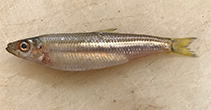| Family: |
Clupeidae (Herrings, shads, sardines, menhadens) |
| Max. size: |
10 cm SL (male/unsexed) |
| Environment: |
pelagic-neritic; brackish; marine; depth range 10 - 13 m, amphidromous |
| Distribution: |
Western Pacific: southern Australia, from Kalbarri, Western Australia to South Australia, New South Wales and Moreton Bay, Queensland. |
| Diagnosis: |
Dorsal spines (total): 0-0; Dorsal soft rays (total): 12-18; Anal spines: 0-0; Anal soft rays: 16-27. Body fairly elongate, belly keeled, with 19 to 24 - 10 to 13 scutes; 23 to 27 dorsal scutes with low keels from head to dorsal fin origin. Second supra-maxilla paddle-shaped, lower portion larger. Branchiostegal rays 4. Anal fin origin an eye diameter or more behind base of last dorsal fin ray. Scales more or less firm on body; a silvery band along flank. |
| Biology: |
Schools in large numbers in shallow sandy areas of bays and estuaries. |
| IUCN Red List Status: |
Least Concern (LC); Date assessed: 28 February 2017 Ref. (130435)
|
| Threat to humans: |
harmless |
Source and more info: www.fishbase.org. For personal, classroom, and other internal use only. Not for publication.
